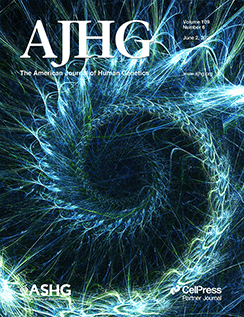Discovery of a DNA methylation profile in individuals with Sifrim-Hitz-Weiss syndrome.
IF 8.1
1区 生物学
Q1 GENETICS & HEREDITY
引用次数: 0
Abstract
Pathogenic heterozygous variants in CHD4 cause Sifrim-Hitz-Weiss syndrome, a neurodevelopmental disorder associated with brain anomalies, heart defects, macrocephaly, hypogonadism, and additional features with variable expressivity. Most individuals have non-recurrent missense variants, complicating variant interpretation. A few were reported with truncating variants, and their role in disease is unclear. DNA methylation episignatures have emerged as highly accurate diagnostic biomarkers in a growing number of rare diseases. We aimed to study evidence for the existence of a CHD4-related DNA methylation episignature. We collected blood DNA samples and/or clinical information from 39 individuals with CHD4 variants, including missense and truncating variants. Genomic DNA methylation analysis was performed on 28 samples. We identified a sensitive and specific DNA methylation episignature in samples with pathogenic missense variants within the ATPase/helicase domain. The same episignature was observed in a family with variable expressivity, a de novo variant near the PHD domain, variants of uncertain significance within the ATPase/helicase domain, and a sample with compound heterozygous variants. DNA methylation data revealed higher percentages of shared probes with BAFopathies, CHD8, and the terminal ADNP variants encoding a protein known to form the ChAHP complex with CHD4. Truncating variants, as well as a sample with a recurrent pathogenic missense variant, exhibited DNA methylation profiles distinct from the ATPase/helicase domain episignature. These DNA methylation differences, together with the distinct clinical features observed in those individuals, provide preliminary evidence for clinical and molecular sub-types in the CHD4-related disorder.Sifrim-Hitz-Weiss综合征个体DNA甲基化谱的发现。
CHD4的致病性杂合变异体导致Sifrim-Hitz-Weiss综合征,这是一种神经发育障碍,与脑异常、心脏缺陷、大头畸形、性腺功能减退和其他具有可变表达性的特征相关。大多数个体有非复发性错义变异,使变异解释复杂化。据报道,少数人有截断变异,它们在疾病中的作用尚不清楚。在越来越多的罕见疾病中,DNA甲基化表观特征已经成为高度准确的诊断生物标志物。我们的目的是研究存在与chd4相关的DNA甲基化特征的证据。我们收集了39名CHD4变异患者的血液DNA样本和/或临床信息,包括错义和截断变异。对28份样本进行基因组DNA甲基化分析。我们在atp酶/解旋酶结构域内具有致病性错义变异的样本中发现了敏感和特异性的DNA甲基化表观特征。在一个具有可变表达性的家族中,在PHD结构域附近的一个新生变异,在atp酶/解旋酶结构域内的不确定意义的变异,以及具有复合杂合变异的样本中观察到相同的特征。DNA甲基化数据显示,与BAFopathies、CHD8和末端ADNP变体(编码一种已知与CHD4形成ChAHP复合物的蛋白质)共享探针的百分比更高。截断变异体,以及具有复发性致病性错义变异体的样本,显示出与atp酶/解旋酶结构域表观特征不同的DNA甲基化谱。这些DNA甲基化差异,以及在这些个体中观察到的不同临床特征,为chd4相关疾病的临床和分子亚型提供了初步证据。
本文章由计算机程序翻译,如有差异,请以英文原文为准。
求助全文
约1分钟内获得全文
求助全文
来源期刊
CiteScore
14.70
自引率
4.10%
发文量
185
审稿时长
1 months
期刊介绍:
The American Journal of Human Genetics (AJHG) is a monthly journal published by Cell Press, chosen by The American Society of Human Genetics (ASHG) as its premier publication starting from January 2008. AJHG represents Cell Press's first society-owned journal, and both ASHG and Cell Press anticipate significant synergies between AJHG content and that of other Cell Press titles.

 求助内容:
求助内容: 应助结果提醒方式:
应助结果提醒方式:


